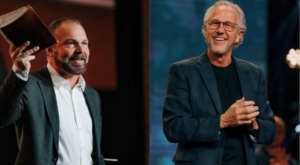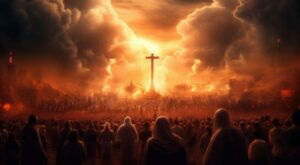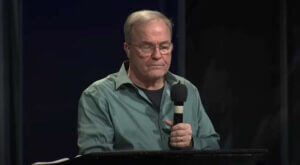Editor’s Note: Michael Brown’s blog, In the Line of Fire, is now available as a newsletter. To have his cutting-edge commentary delivered to your email inbox—for free—click here.
In the aftermath of the acquittal of George Zimmerman in the shooting of Trayvon Martin, it is clear that black Americans and white Americans, many of whom are committed Christians, have vastly different perspectives on the trial and the verdict, and each side is saying to the other, “Don’t you get it?”
Of course, in Jesus, we are all ultimately on the same side, and there is no black or white (or red or yellow or brown) in Him. But on a practical level, we often have different perspectives based on our upbringing and ethnicity and culture, and at a critical time like this for our nation, it is imperative that, as believers, we talk to each other, not past each other.
When I teach on apologetics, I often start by laying out two foundational principles:
1. To do good apologetics, it is essential that you understand the other person’s objection.
Unfortunately, we often respond to what we think the other person is saying, and so we pass each other like ships in the night. A good way to avoid this is to restate the other person’s position in your own words, saying, “So, if I understand you, this is your objection, correct?”
If you can do that to their satisfaction, you’ve already come a long way.
2. To do good apologetics, it is essential that you feel the weight of the other person’s objection.
This is more easily said than done, since it requires you to get into the shoes of the other person, to see the world through their eyes, to be able to articulate a position you differ with, even to challenge some of your own views along the way.
It is a costly and painful process but one that is crucial if we are to reach those outside of our camp—theologically, culturally and socially.
How do these principles apply when dealing with the current racial conflicts in America?
As a white male raised in a middle-class, suburban home on Long Island and with a happily married mom and dad, I do not see the world through the same eyes as someone who grew up in grinding poverty on the streets of India or who was raised in the midst of gang violence in inner-city Chicago.
In order for me to gain these perspectives, I need to recognize the limitations of my own perspective and listen with an open heart to those from other cultures and backgrounds.
Having ministered overseas on more than 120 trips since 1987 and having spent countless hours with believers from other nations, I have a better understanding of how Americans are perceived in many parts of the world. Not everyone likes us!
The same can be said of us New Yorkers. What we consider to be normal, direct, appealing and even funny is often perceived by other Americans—especially in the South—to be arrogant, abrasive and obnoxious.
On the flip side, what many Southerners consider to be polite and discreet appears to New Yorkers to be hypocritical and deceitful.
Dare we listen to each other and, at least, become sensitive to these different perceptions? Dare we ask if everything that is our part of our culture is actually correct, let alone Christlike?
As I have listened carefully to African-American callers on my Line of Fire radio broadcast and read their comments on my Facebook page, I have done my best to practice these principles, asking myself where I have blind spots, trying to see where I have a limited set of perceptions that needs to be augmented by their different perspectives.
I would appreciate it if my African-American readers (or those with similar life experiences and backgrounds) would tell me if these are some of their most fundamental concerns:
- Blacks still receive harsher prison sentences than whites.
- Blacks are presumed guilty more quickly than whites and are immediately stereotyped and racially profiled.
- In some parts of the country, it is difficult, if not impossible, for an African-American to get a fair trial. (If Trayvon Martin had killed George Zimmerman, how would I have felt if the jury that acquitted him was 85 percent black? Wouldn’t I be questioning the verdict?)
- There is a good reason for African-Americans to distrust the police and the legal system.
- There are some things that those who come from “privileged” backgrounds cannot possibly relate to.
- Segregation is hardly some forgotten relic from the distant past.
Are these some of the most important perspectives you would want someone from my background to see? What are others you would put on the list?
From my perspective—if I may be so bold—these are some of the perspectives I would love for my African-American friends to see:
Must everything be seen through the lens of race? (For example, when I criticize President Obama, I don’t see color; I see issues. Yet some of my black Christian friends wrongly see my criticisms as racially based.)
Isn’t it time to forgive the past and move on? (Israel and Germany have excellent relationships today, despite the Nazis slaughtering two out of every three Jews in Europe, including 1.5 million Jewish children.)
Why is it OK for blacks to call out white racism but whites can’t call out black racism?
Where are the black Christian leaders renouncing the words and actions of men like Al Sharpton and Jesse Jackson, just as I would be expected to renounce the words and actions of white conservative leaders who are fueling the fires of racial division and hatred?
If the loss of a young black life is so tragic—and I agree that it is—where are the rallies and demonstrations on behalf of the thousands of black youths killed in black-on-black inner-city violence? And why the anger over a court verdict that even Charles Barkley thought was fair but no expression of anger over the riots and beatings taking place across the nation?
Before God, I mean no offense in raising these questions, and I wrestled with them in prayer before writing them. But it is because I love the unity of the body, because I deeply value and honor my brothers and sisters of color, and because I actually sense a special connection between the Jewish people and the African-American church that I risk alienating some my brothers and sisters by calling for deeper, more honest, probing, humble conversation.
Thanks for reading, and be assured I’m continuing to listen and learn on my end.
Michael Brown is author of The Real Kosher Jesus and host of the nationally syndicated talk radio show The Line of Fire on the Salem Radio Network. He is also president of FIRE School of Ministry and director of the Coalition of Conscience. Follow him at AskDrBrown on Facebook or @drmichaellbrown on Twitter.
See an error in this article?
To contact us or to submit an article




















